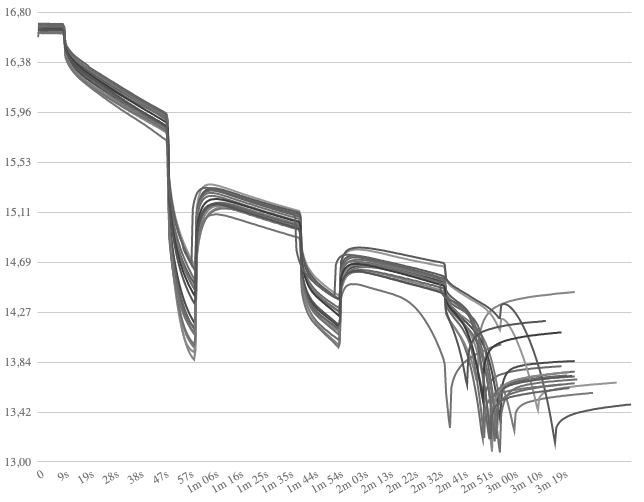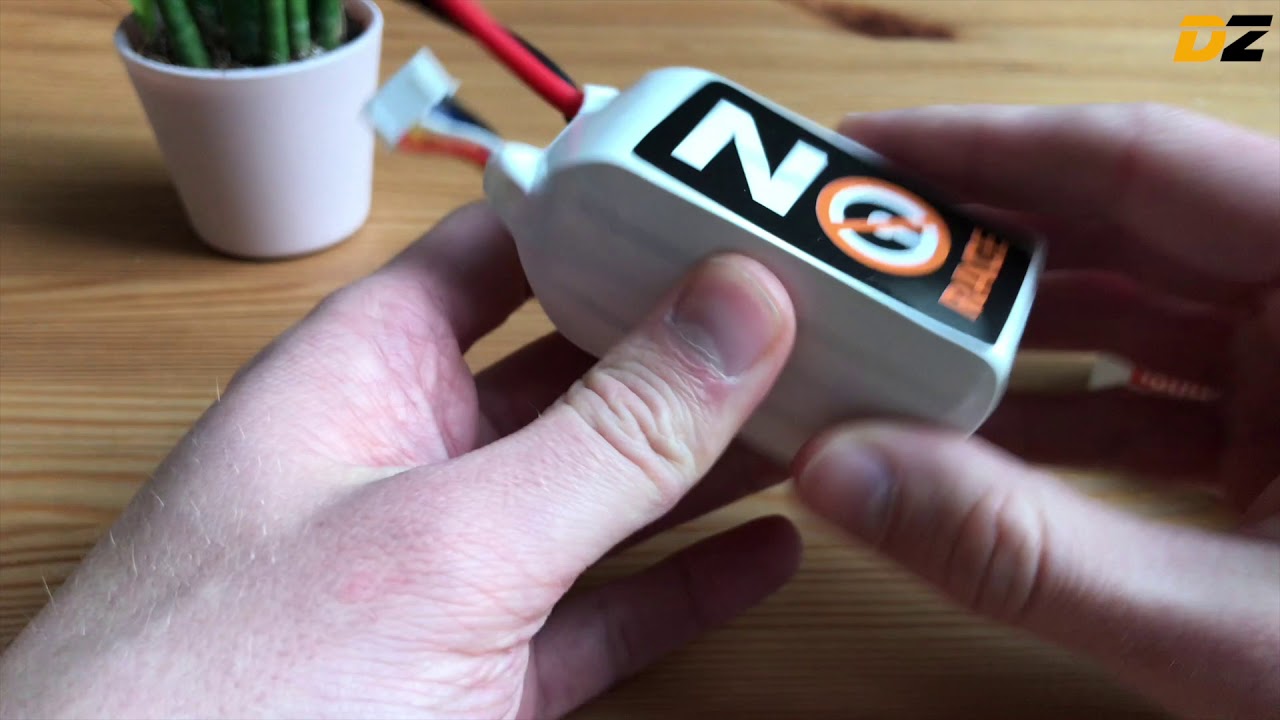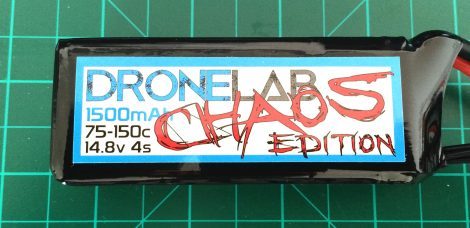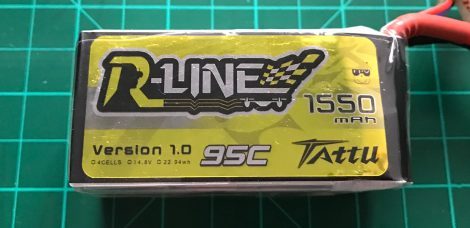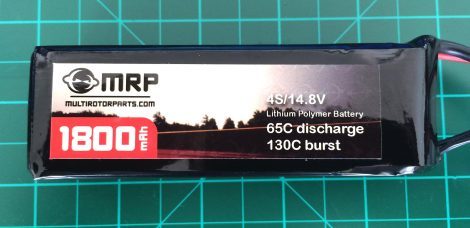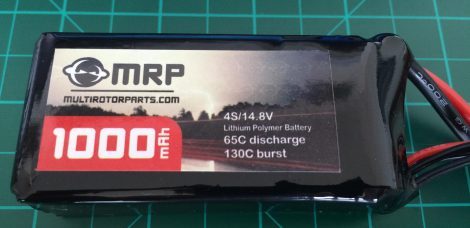We are proud to finally present you our review of the new SLS NOC Race FPV LiPo batteries. Stefans Lipo Shop has offered the cells for quite some time now. More than a good enough reason to put the pack in action on our test stand. This review looks at the SLS NOC Race 4S 1550 mAh 2N pack.
Appearance
Stefans Lipo Shop ships its packs well packed in a labeled cardboard box. The battery itself is packed in bubble wrap for extra protection. You also get a small paper sheet, with all important security notes on how to handle the lithium battery properly. Unfortunately specs like max charge rate or cut-off recommendations are not directly printed on the battery.

The SLS NOC Race FPV battery line up is the first FPV battery we tested that did not state a C-rating. This is on purpose, of course, as C-rating values of FPV batteries have been going trough the roof in the last year. No question, the elaborate pilot understands that this merely is for marketing reasons, as high numbers always tend to sell better. The SLS NOC Race series burns all bridges with the good old C-rating. Instead SLS uses a proprietary scale to rate the battery performance, which is called „N“ as in „No C“.
- 1N = „hardcore hobby pilot / competition pilots“
- 2N = „wacky competition pilots“
- 3N = „Aliens… testing continues“ (There is no 3N cell, yet.)
Of course, we still will try to put a number on the SLS NOC Race series, using our „true C-rating“ for better comparison. The test pack is labeled to be „2N“ capable.
The overall built-quality is very good – nothing to worry about. The complete 4S line up only differs in width regarding the total dimensions as you can see in the picture below.
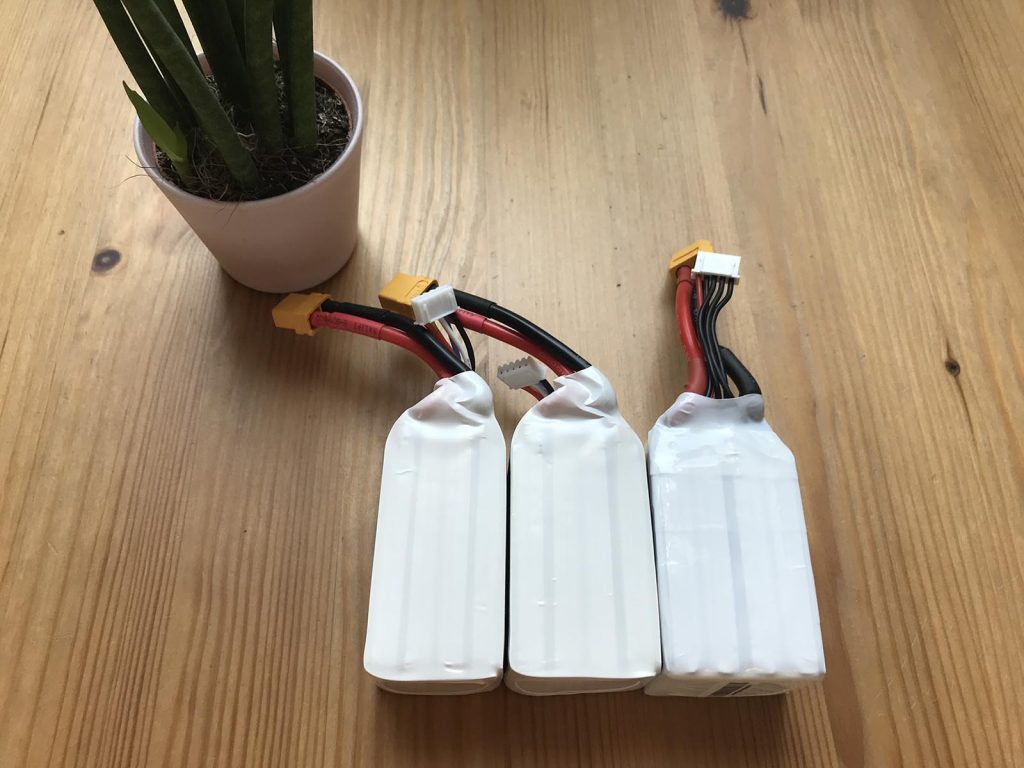
Technical Design
The SLS NOC Race 1550 mAh 2N battery is a standard 4S1P config flight pack for high power use. It utilises the newest generation of SLS NOC cell chemistry. Charge rates up to 10C enable you to fill the pack up really quick, if you ever have the need to. We still favour to stick with 1C charging for our tests.
Build Quality: Very good. The pack feels very well made on the outside. Connection terminal looks solid. The white shrink wrap is really tight. There should be no puffing. It looks like there is a spacer between cell 1 and 2 as well as cell 3 and 4 to allow better ventilation.
Plugs: The SLS pack comes with standard XT60 connectors* equipped.
Cables: Stefans Lipo Shop uses 12 AWG wires* on this packs. The high flexible silicon layer is rated up to 200°C. Cable length is about 6 centimetres.
Balancing plugs: Standard XT-system. Balancer wires* are really short (1.5 cm), which is a benefit in terms of getting them out of the prop-range on the aircraft. Main power wires connect to the top, the balancer cable is connected at the bottom site of the pack.
Technical Details
| Manufacturer | Stefans Lipo Shop / SLS |
| Type | SLS NOC 2N |
| Cell chemistry | Lithium Polymere (LiPo) |
| Cell type | SLS NOC chemistry |
| Cell count | 4 |
| Pack configuration | 4S1P |
| Capacity | 1550 mAh |
| Max. charge current | 15.5 A |
| Discharge current continuous | 2N / ? |
| Max. discharge current | - |
| Weight (incl. plugs) | ca. 186 grams |
| Measurements listed | 72 x 34 x 39 mm |
| Measurements measured | 77 x 34 x 38,8 mm |
| Retail Price | 28,99 € |
| Dealer | Stefans Lipo Shop |
| Note | This battery has been directly donated by the manufacturer / distributor for review purposes. |

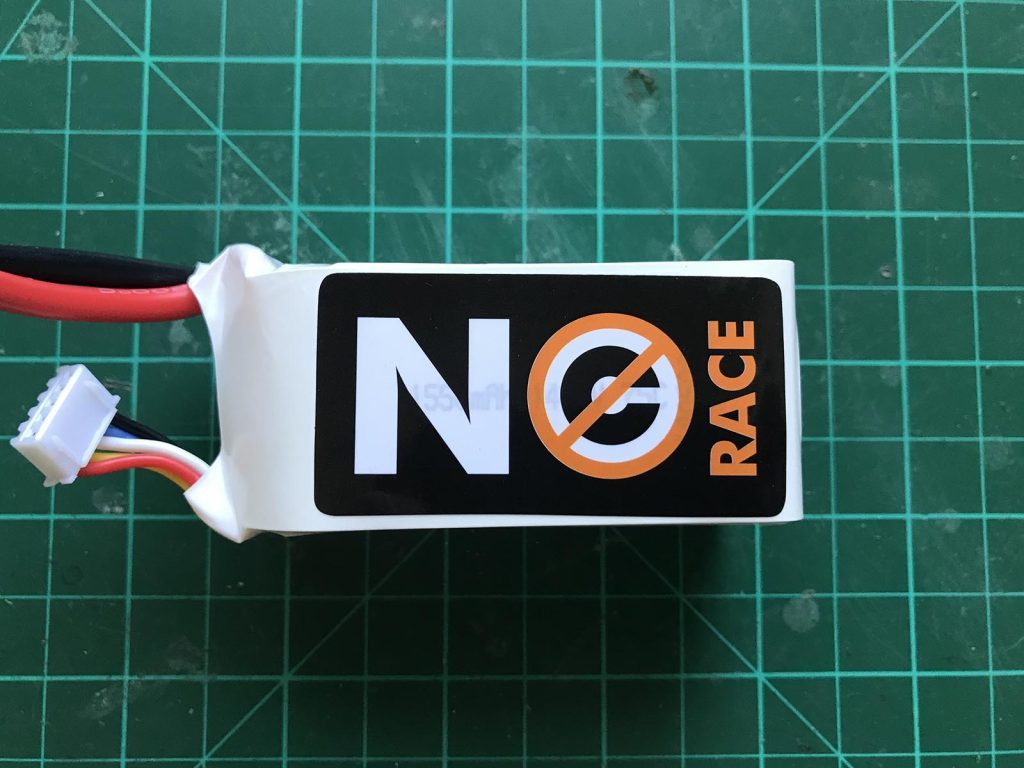



Hands-On Video
We decided to provide you some more impressions by filming a short hands-on video of the SLS NOC Race FPV battery series. It’s in German, still you should be able to get a good impression of the battery’s nice build quality.
Break-in documentation
The battery followed the standard break-in-process: The pack is charged at a rate of 1C until CV-phase ends with current of 1/10C. The break-in phase consists of four charging cycles at 1C and four corresponding discharges at 1 C / 4C / 10C and 20 C.
Anomalies: No anomalies during break-in.
Charging process
CV-Phase is short on this cell type. Balancing in normal mode took 0:55 min. Cell drift during charge was unobtrusive. This is for ca. 1C charge (1.5 A).
Load Testing
The main part of this battery test will consists of different load test settings showing the battery performance. Constant load testing is used to judge the advertised C-ratings as well as look at cell drift under high loads. We also check on internal resistance once more. Next up is the dynamic current test, which simulates a „real“ flight with changing (=dynamic) loads. For test methodology please check the dedicated methodology page!
Constant Load Testing
Constant load testing follows a certain load pattern of different constant currents. Base load is 10 C. Current pulses at 50 C, 35 C, 20 C and 30 C are maintained for time intervals between 10 and 20 seconds. For more details please refer to the test methodology page.
Capacity Usage
During this test the pack delivered 1091 mAh. This is 70.4 % of nominal capacity. A good result.
Average cell voltages
The following table lists the average voltages per cell, of the total pack, as well as the averaged value per cell as fraction of total voltage during phase of active load.
| Cell 1 | Cell 2 | Cell 3 | Cell 4 | Total | Average per cell | |
| Avg. Voltages | 3.776 V | 3.768 V | 3.776 V | 3.771 V | 15.090 V | 3.773 V |
Just looking at average values the SLC pack performs perfectly well. All cells stayed far above 3,7 V on average. An average value above 3,74 V / cell can be considered very good. The SLS NOC Race 1550 mAh managed to score an average of 3.773 V / cell!
Focus Voltages
Exceptionally interesting when testing a battery under a constant load for a longer period of time: the lowest voltage per cell just before load impulse is disabled. On top, you should have look at voltage recovery rate, that is: how fast do cell voltages rise again once load impulse is cut.
| Phase | Cell 1 | Cell 2 | Cell 3 | Cell 4 | Total |
| End of 50 C | 3.655 V | 3.653 V | 3.661 V | 3.649 V | 14.617 V |
| End of 35 C | 3.591 V | 3.584 V | 3.591 V | 3.586 V | 14.352 V |
| End of 20 C | 3.366 V | 3.282 V | 3.329 V | 3.302 V | 13.279 V |
| End of 30 C | - | - | - | - | - |
Voltage sag is extremely low on the SLS NOC Race 1550 mAh pack. It becomes visible that even the 50C phase almost bores the pack. No cell went below 3.6 V on this high load phase.
Average voltage recovery per second
Those values are specific to the test setting and not valid for the pack in general! Still they allow an estimated guess about how fast voltages rise again after current spikes.
| Cell 1 | Cell 2 | Cell 3 | Cell 4 | Total | |
| Avg. Recovery | 0.0258 V / s | 0.0253 V / s | 0.0250 / s | 0.0261 V / s | 0.1022 V /s |
As voltage sag in overall is very load (even on amp spikes), voltage recovers very quick accordingly. Nothing to complain here.
IR-Measurement
IR measurement is conducted using the four current pulses. Resistance for each cell is calculated in all four discharge phases. Shown values are averaged to cancel out different temperature points due to different discharge states during measurements.
| Cell | 1 | 2 | 3 | 4 | Total |
| Resistance [mΩ] | 2.14 | 2.15 | 2.201 | 2.00 | 8.3 |
Interpretation: The internal resistance of 2.28 mΩ average per cell indicates a „true“ C-rating of around 43 C (66.9 A). This is on the conservative side and represents a current draw that will make the pack last for a long time. This estimation falls in line with the very good voltage stability of the pack. This value is a very good result.
Cell drift under load
| Discharge Phase | 50 C | 35 C | 20 C | 30 C |
| Max Cell drift (V) | 0.030 V | 0.024 V | 0.092 V | - |
Cell drift is very low on the new SLS NOC Race 2N packs during main discharge phase. Cells are matched decent on our test packs.
Key Temperature Facts

Temperature Development
Max. temp during discharge was around 48.8 °C on the side of the pack. This is a really good value. The pack stays surprisingly cool, which underlines the low IR-values we have measured. Note that heating of stressed LiPo packs will continue for some more time even when load is cut.
Market Comparison
The following chart shows all reviewed LiPos in the same product segment for direct comparison of performance. Higher values under load are better.
Constant 25 C Discharge
Pretty much a standard benchmark in the LiPo industry.
Cut-Off /warning value for this battery should be chosen 3.5 V minimum. After this point voltage drops quick.
Capacity Usage
The battery provided 1114 mAh (71.9 %) during the 25 C discharge.
Market Overview
Comparison of different reviewed 1500 mAh to 1550 mAh batteries under 25 C load.
Dynamic Load Testing
The dynamic load testing setting consists of two separate discharge scenarios that have been developed of two different real-life FPV flights. Pattern one represents a high speed low proximity flight around the open field with some hovering to the end. Average load is around 22 A. Second pattern is a free-style flight around trees in the park with some current spikes near 70 A. Average load on this flight is around 13 A due to longer floating periods.
Capacity Usage
During the test of pattern 1 the pack delivered 1098 mAh. This is 70.8 % of nominal capacity. Decent. In patter 2 testing 1097 mAh (70.8 %) could be used until first cell reached cut-off voltage.
Market Comparison
The following charts give an overview of all tested packs in the 1500 mAh class so far.
The last chart of this review sums up the usable capacity during all four load scenarios. Please note that this is only the capacity consumed by the electronic load! There are losses due to heating of the pack, which could be approximated (see testing methodology page). All four tests are cut when any cell goes below cut-off voltage of 3,3 V (or pack goes above 58 °C on any of the three probes). If you would push further and go down to 3,0 V/cell you will be able to squeeze out some mAh more, but at the cost of excessive heat generation and shortening of pack life-span. This value will most likely differ from what you get when flying on a quad as most people don’t monitor voltage on a per cell basis and therefore don’t even notice if voltage drops below 3,3 V/cell during punsh-outs (what’s not necessarily a good thing, though). For comparison, used capacity until 3,3 V/cell is reached is the base line in all battery reviews on Drone-Zone.de.
Conclusion
The new SLS NOC Race 4S 1550 mAh 2N battery is a small sized pack with a capacity to weight ratio of 8.33 mAh/g. This falls in line with the weight ratio of other high power packs. Graphene batteries tend even to be heavier. Build quality of this battery is excellent.
The pack is rectangular shaped and keeps it shape under every load situation – no puffing what so ever! Voltage stability is one of the best we have seen yet. Cut-off should be chosen at 3,5 V / cell minimum.
Usable battery capacity is decent. We think „1500 mAh“ oft is a more appropriate labelling for most 1550-mAh-packs. Cell matching is very good as well, absolutely nothing to complain about here.
The rating of 2N rating will be a mystery to the educated FPV pilot at first. We would rate this pack at decent 43 C continuous. This allows you to pull around 66.9 A without having to worry about the packs health too much.
More than enough head room for even the most demanding drone racers. As you can see in the dynamic load test, higher current spikes are handled very well. The battery almost seems bored even at highest loads.
Very positive we have found the low operating temperatures, even under constant loads. The low IR translates into extremely low temperatures – and that’s with pre-heating as we do on all the tests.
For 28,99 € (retail price) this pack is certainly well worth its money. It outperforms some of the well known battery competitor products without any problems. The Dinogy Ultra Graphene 2.0 1500 mAh might be an alternative for you, if you need even more punch.
In the end 28,99 € are still well invested, if you are looking for a 1550 mAh FPV battery that will keep up with rising power demands and has a great built quality all around.
Trying out the SLC NOC Race 4S 1550 mAh 2N is definitely worth a shot. We still can’t wait for the day, SLS discovers a cell chemistry worthy of being labeled „3N“.
Pro
- Low IR (= high „true C rating“)
- „NO C“ is a noble approach to escape the C-rating marketing hype
- very high build quality
- perfect voltage stability
- low operating temperatures (most likely to last you for a long time)
- fair pricing
Contra
- having all important data printed on the battery itself would have been nice
- the battery performs more like a 1500 mAh than 1550 mAh a pack
- the balancer wire is a little too short for our taste
Other packs of this line up tested:



